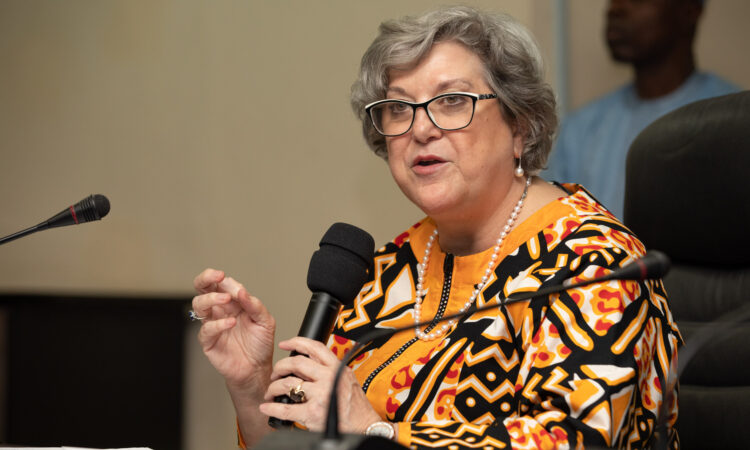

“To think about how we make it better, it is a question of looking at where we intervene and then what is the next step that we need to do,” she said.
The US Ambassador to Nigeria, Mary Beth Leonard, has highlighted seven areas where the US and Nigeria can improve collaboration.
The areas are health, education, climate change, space exploration, security cooperation, humanitarian assistance and cultural preservation, she said.
She highlighted this in an exclusive interview with PREMIUM TIMES to mark the end of her posting as ambassador to Nigeria.
Ms Leonard described the 60-year relationship between both countries as one which always seeks to improve itself.
“To think about how we make it better, it is a question of looking at where we intervene and then what is the next step that we need to do,” she said.
On health, Ms Leonard noted that the next step for the US support to Nigeria is to make such support a better or more predictable part of Nigeria’s health systems and health systems delivery.
Additionally, “since we are very close to epidemic control, how do we go about finding those last people? What is the strategy that you need to find the people that you have not already managed to come across?” she said.
On humanitarian assistance in the North-east and North-west, regions affected by terrorism, she called for reflection on how to transform all the assistance into a sustainable future for everyone.
According to the UN Office for the Coordination of Humanitarian Affairs (UNOCHA), $1.3 billion is needed to provide critical lifesaving assistance to six million people in North-east Nigeria.
This is an increase of 500,000 people from the 5.5 million people identified for assistance in 2022.
Of the $1.3 billion required, $631 million is urgently needed for an emergency response to the 2.4 million people in acute need, the UN agency said.
On cultural preservation, the Smithsonian and other Western institutions recently started to repatriate stolen artefacts back to Nigeria. Ms Leonard said it is “wonderful to have them home”, however, “we need to collaborate, how should those be curated? how can they be used as a mechanism to bring museums and citizens and artists together to examine a wonderful cultural heritage?”
On visa application by Nigerians, the diplomat said she knows that many students will appreciate a reduced waiting time for their visas; something the US will continue to make efforts in. She said she is proud that Nigeria is the largest source of African students in the United States.
On security cooperation, she said Nigeria and the US have “a robust partnership including for example the recent sale of the A29 Super Tucanos.”
“And so, as we move forward and think about other platforms, how do we reinforce effectiveness and precision and make sure that citizens are kept safe,” she said.
Speaking on space exploration, Ms Leonard said “Nigeria at the African leaders’ summit signed the Artemis accords which is all about space; so moving forward, how do we organise a responsible civilian space exploration.”
On the climate crisis, she recalled that the US government gave funding support in response to the recent floods in Nigeria. However, moving forward, it is important to figure out how to balance climate concerns and address them with the importance of Nigeria’s own power needs, access to electricity for example, she said.
“So my time is coming to a close here but on all of these things I will be watching to see how that evolution continues,” she said.
|